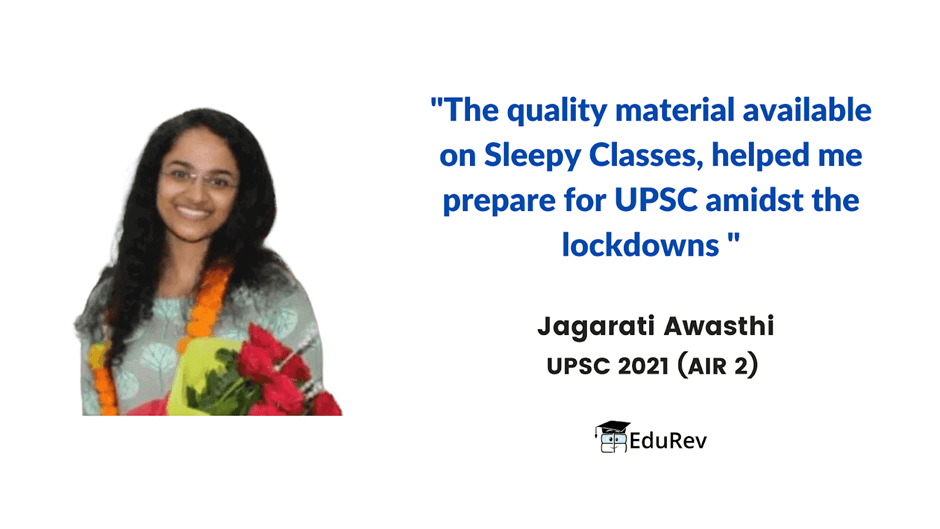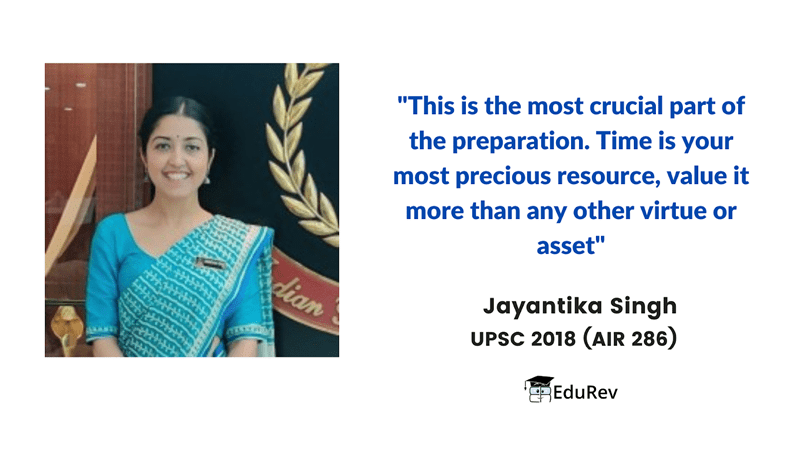UPSC Exam > UPSC Notes > How to Study for UPSC with Sleepy Classes on EduRev > How to study History with Sleepy Classes on EduRev
How to study History with Sleepy Classes on EduRev | How to Study for UPSC with Sleepy Classes on EduRev PDF Download

1. What is Sleepy Classes?
- Sleepy Classes is a one-stop solution for students across regions and diverse backgrounds to prepare for UPSC, which is one of the toughest competitive examinations in the country through video lectures and doubt resolution.
- Over the past so many years, sleepy classes have successfully helped over 3,70,000 students to study for their UPSC dream.
- Sleepy Classes has mentored numerous toppers, including Jagarati Awasthi AIR 2 UPSC 2021, Srushti Deshmukh AIR 5 UPSC 2018, Raunak Agarwal AIR 13 UPSC 2019, Swati Sharma, AIR 17 UPSC 2019, Ruchi Bindal AIR 37 UPSC 2019 and many more.

2. Sleepy classes strategy of teaching History
The UPSC examination is one of the toughest examinations in the country owing to its low conversion rate and the sheer vastness of the syllabus. Keeping this in mind, Sleepy classes have created high-quality content which caters to most portions of the syllabus:
- All subjects within General Studies for both Prelims and Mains
- Sociology Optional
- Political Science Optional
- Dedicated Answer writing.

(i) Use your time efficiently
- It is easy to get lost in the syllabus of History for UPSC as it is the largest among all the other subjects, with the syllabus covering Ancient History, Medieval History, Modern History, World History and Culture.
- To counter this issue, Sleepy Classes bring you the consolidated video lectures of each topic, for which the material has been compiled from the best resources available in the market. They have read and researched each topic, so you don’t have to.
- Aspirants generally spent hours of their time searching for the best material to study for each individual subject and topic, time which could have been spent actually studying and revising for the main examination.
- With one-hour lectures on each topic from experienced and reputed teachers, Sleepy classes provide you with a pathway for your UPSC journey.
(ii) History = Hi Story - Learning everything in story format
- All the toppers of UPSC have stated that one of the hardest parts of studying history for UPSC is to remember the chronology, the dates, the places and the names of the people and incidents we are studying.
- Sleepy Classes lectures are tailored in such a way, that every topic is taught in a story format for better understanding and remembrance of each topic during the examination.
- Sleepy Classes convert History to Hi - Story for you with their video lectures.

- While it is important to study every topic in the syllabus, one must understand that every topic does not hold the same importance from the examination point of view.
- Thus, it is important what topics to revise more properly during the revision once the course is completed. Sleepy classes video lectures and pdf’s identify those topics to help you utilise your time efficiently.
3. What is offered by Sleepy Classes on EduRev?
In the course of history, you would find detailed video lectures of each topic, whose material has been compiled from the best resources in the market taught by an experienced teacher in a way to help you retain all you have learnt, with PDFs of each lecture available for a quick revision.
- Ancient History - Pre - History, Harappan Civilization, The Vedic Age, Janapadas & Mahjanapadas, Buddhism & Jainism, Post Maurya’s, The Gupta’s, Harsha Vardhana, The Sangam Age
- Medieval History - Pallavas, Chalukyas & Rashtrakutas, Imperial Cholas, Early Medieval India, Delhi Sultanate, The Mughals, Delhi Sultanate & Mughals: Arts & Administration, Vijaynagara Empire, Later Mughals, Marathas Period
- Modern History - The Europeans & the Establishment of British in Bengal, Expansion of the British, Consolidation of British, The Revolt of 1857, Post 1857 Scenario, Socio-Religious Reforms in the 19th Century, Indian National Movement
- World History - Renaissance A.R., F.R. & Napoleon, Europe in the 19th Century, French Revolution, World War - I, Post World War I Scenario, World War II, Revolutions in Russia.
4. Other courses offered by Sleepy Classes on EduRev:
- International Relations for UPSC 2022 (Pre & Mains)
- Science & Technology for UPSC 2022 (Pre & Mains)
- Geography for UPSC 2022 (Pre & Mains)
- Polity for UPSC 2022 (Pre & Mains)
- Ethics for UPSC 2022 (Pre & Mains)
- Economy for UPSC 2022 (Pre & Mains)
- Social Issue for UPSC 2022 (Pre & Mains)
- Environment for UPSC 2022 (Pre & Mains)
- Sociology Mains Optional for UPSC 2022
- Political Science & International Relations Optional for UPSC 2022
The document How to study History with Sleepy Classes on EduRev | How to Study for UPSC with Sleepy Classes on EduRev is a part of the UPSC Course How to Study for UPSC with Sleepy Classes on EduRev.
All you need of UPSC at this link: UPSC
FAQs on How to study History with Sleepy Classes on EduRev - How to Study for UPSC with Sleepy Classes on EduRev
| 1. How can I effectively study History when I have sleepy classes? |  |
Ans. When you have sleepy classes, it is important to find ways to stay focused and engaged while studying History. Here are some tips to help you study effectively:
- Create a study schedule: Plan your study sessions when you are most alert and able to concentrate. Avoid studying during your sleepy classes or late at night when you are tired.
- Take short breaks: Break your study sessions into smaller chunks and take short breaks in between. This will help you stay refreshed and avoid feeling overwhelmed.
- Use active learning techniques: Instead of passively reading through your history textbook, try to actively engage with the material. Take notes, create flashcards, or discuss the topics with a study group to enhance your understanding and retention.
- Find a quiet and comfortable study space: Choose a location where you can minimize distractions and feel comfortable. A quiet library or a dedicated study room can help you stay more focused and alert.
- Stay physically active: Engaging in regular physical activity can help boost your energy levels and improve your overall alertness. Consider incorporating exercise or movement breaks into your study routine.
Remember, it is important to prioritize your sleep and maintain a healthy sleep schedule. If you consistently struggle with sleepiness during classes, consider speaking with a healthcare professional to rule out any underlying health issues.
| 2. How can I improve my concentration during sleepy classes? |  |
Ans. Improving concentration during sleepy classes can be challenging, but there are strategies you can try to stay focused. Here are some tips:
- Get enough sleep: Prioritize getting adequate sleep at night to ensure that you are well-rested and alert during your classes. Aim for 7-9 hours of sleep per night.
- Stay hydrated: Dehydration can contribute to fatigue and difficulty concentrating. Make sure to drink enough water throughout the day to stay hydrated.
- Sit in an active posture: Sitting up straight and maintaining an active posture can help promote alertness and prevent drowsiness. Avoid slouching or lounging during class.
- Take notes actively: Actively taking notes during class can help you stay engaged and focused. Summarize key points, highlight important information, and jot down any questions or thoughts that come to mind.
- Participate in class discussions: Engaging in class discussions can keep you actively involved and prevent your mind from wandering. Ask questions, share your thoughts, and participate in group activities whenever possible.
- Use visual aids: Visual aids such as diagrams, charts, or slides can help stimulate your visual senses and enhance your concentration. If available, use these resources to supplement your learning.
- Take short breaks: If you find yourself struggling to concentrate, take short breaks to refresh your mind. Stretch, walk around, or do a quick mental exercise to re-energize yourself.
Remember, if you consistently struggle with concentration and sleepiness during classes, it is important to address any underlying issues by seeking professional help.
| 3. How can I retain information when studying History with sleepy classes? |  |
Ans. Retaining information while studying History with sleepy classes can be a challenge, but with the right strategies, it is possible. Here are some tips to help you retain information effectively:
- Review and summarize: After each class or study session, take a few minutes to review and summarize the key points. This will help reinforce the information in your memory and make it easier to recall later.
- Use mnemonic devices: Mnemonic devices, such as acronyms or visual imagery, can help you remember complex historical facts or timelines. Create your own mnemonic devices or look for existing ones online.
- Test yourself: Regularly test yourself on the material you have studied. Use flashcards, practice quizzes, or ask a friend to quiz you on the important concepts. This active recall technique can enhance your long-term memory.
- Teach someone else: Explaining historical concepts or events to someone else can help solidify your understanding and retention. Find a study partner or teach a friend or family member what you have learned.
- Make connections: Try to connect the historical information you are studying with real-life examples or other subjects you are interested in. Creating these connections can make the information more meaningful and memorable.
- Break it down: If you find it challenging to remember large chunks of information, break it down into smaller, manageable sections. Focus on one topic or era at a time and gradually build your knowledge.
- Get enough sleep: Adequate sleep is crucial for memory consolidation. Make sure to prioritize your sleep and establish a consistent sleep schedule to optimize your retention of historical information.
Remember, everyone has different learning styles and techniques that work best for them. Experiment with different strategies and find what works most effectively for you.
| 4. Can studying History before bedtime help with retention? |  |
Ans. Studying History before bedtime can be beneficial for retention, but it may vary from person to person. Here's why studying before bedtime can help with retention:
- Memory consolidation: During sleep, the brain consolidates and strengthens memories. By studying History before bedtime, you are providing the brain with fresh information to process and organize during sleep, potentially enhancing your retention.
- Reduced interference: Studying before bedtime can help minimize interference from new information or distractions that may occur during the day. With fewer distractions, your brain can focus on consolidating the historical information you have studied.
- Enhanced recall: When you study before bedtime, you can take advantage of the "retrieval practice" effect. This effect suggests that recalling information from memory strengthens the memory traces, leading to better long-term retention.
However, it is important to note that individual preferences and sleep patterns may vary. Some people may find it difficult to concentrate or may experience sleep disruptions if they study right before bed. It is crucial to listen to your body and experiment with different study schedules to determine what works best for you.
| 5. How can I stay motivated to study History even during sleepy classes? |  |
Ans. Staying motivated to study History during sleepy classes can be challenging, but with the right mindset and strategies, you can maintain your motivation. Here are some tips to help you stay motivated:
- Set goals: Define clear and achievable goals for your history studies. Whether it's completing a certain number of chapters or achieving a specific grade, having goals can provide you with a sense of purpose and motivation.
- Break it down: Rather than focusing on the entire subject at once, break your history studies into smaller, manageable tasks. This will make the workload feel less overwhelming and help you stay motivated.
- Find relevance: Discover the relevance of history to your life and future goals. Understand how historical knowledge can help you make informed decisions, develop critical thinking skills, and gain a deeper understanding of the world.
- Seek support: Surround yourself with a supportive study group or seek guidance from a knowledgeable teacher or mentor. Engaging with others who share your interest in history can help you stay motivated and provide opportunities for discussions and collaborative learning.
- Reward yourself: Set up a system of rewards for achieving your study goals. Treat yourself to something you enjoy after completing a challenging chapter or reaching a significant milestone. This can help reinforce positive behavior and motivate you to continue studying.
- Stay positive: Maintain a positive mindset and focus on your progress rather than getting discouraged by setbacks or difficulties. Celebrate small achievements and remind yourself of the importance and value of studying history.
Remember, motivation can fluctuate, and it is normal to have ups and downs. During sleepy classes, it is important to take care of your physical and mental well-being, as it can significantly impact your motivation levels.
Related Searches

















